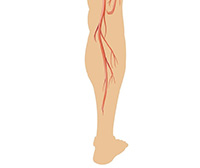 Do your legs cramp, particularly when you walk or exercise? Does that pain go away when you rest?
Do your legs cramp, particularly when you walk or exercise? Does that pain go away when you rest?
Unexplained leg pain like this is the most common symptom of peripheral artery disease (PAD). It's a circulatory problem in which arteries clogged with plaque reduce blood flow to your extremities, usually your legs.
More than 8.5 million US adults 40 and older have PAD, but many don't know it. Other possible signs and symptoms of the disease include:
• Slow-healing sores on your toes, feet or legs.
• Pale or bluish skin.
• A lower temperature in one leg than the other.
• Poor toenail growth.
• Poor hair growth on your legs.
• Weak pulse or no pulse in the legs or feet.
• Erectile dysfunction in men with diabetes.
Your risk rises with age, since plaque builds up in your arteries as you grow older. High cholesterol, high blood pressure and extra pounds all increase risk too. And smokers and people with diabetes are especially susceptible to PAD.
If you're at risk for PAD, it's important to know these four things:
1. You shouldn't ignore signs or symptoms. Tell your doctor about them. PAD raises your risk for heart attack and stroke, so it needs to be treated.
2. PAD is easily diagnosed. For example, your doctor may do a quick, painless test that compares the blood pressure in your ankle to the blood pressure in your arms.
3. You can take control of PAD. A healthy lifestyle, medicine or both may be enough to control your PAD symptoms. Eat a heart-friendly diet, be active (with guidelines from your doctor), control your diabetes if you have it, and stop smoking if you light up. Be sure to take any medicine your doctor prescribes exactly as directed too.
4. There are other treatments if needed. If the steps above aren't sufficient, your doctor may advise a minimally invasive procedure—like angioplasty—or bypass surgery to improve flow in a blocked artery. Be sure to discuss all your options.
Watson Clinic team of
Internal Medicine and
Family Medicine specialists can help assess your risk for PAD and offer treatments to control it. Call 863-680-7190 to schedule an appointment.
Sources: American Academy of Family Physicians; American Heart Association; National Heart, Lung, and Blood Institute